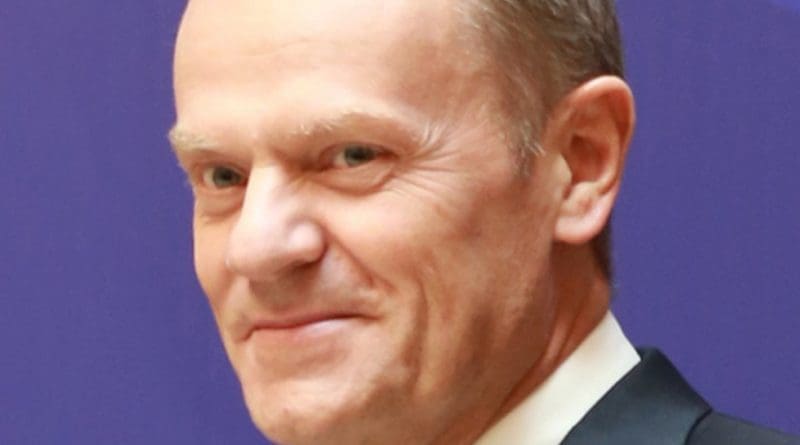Tusk joins ‘Visegrad Four’ In Attack On Nord Stream 2
By EurActiv
By Georgi Gotev and Adéla Denková
(EurActiv) — The ‘Visegrad Four’ countries (Poland, Czech Republic, Slovakia and Hungary) found a powerful ally at the EU summit which ended today (18 December) in the person of Council President Donald Tusk, who repeated most of their arguments against the Germany-favoured project.
The leaders of the Visegrad countries, also known as V4, have reportedly argued that that the Nord Stream 2 pipeline project, which is expanding the gas supplies from Russia to Germany across the Baltic Sea, is against the strategic interests of the EU and undermines its ambition to build an Energy Union.
The move is hardly a surprise, as at least seven countries from Central Europe, including the V4, recently took positions against the project in joint letters to the EU executive at the level of energy ministers and to Tusk at Prime Minister level.
EurActiv Czech Republic asked the Czech Prime Minister if there were differences in the positions of the V4 countries with respect to South Stream. The Czech Republic did not sign the letter of the seven ministers addressed to Commission Vice President Maroš Šefčovič, but only the letter of V4 Prime Ministers and Romania to Tusk, which did not refer directly to Nord Stream.
“There are no differences among Visegrad states on this. We are ready to act together”, Sobotka said.
He added: “Together, we perceive the Nord Stream 2 project as controversial. We think it goes against the strategic interests of many countries in the EU and it economically harms Ukraine. We have – and I think we will have also in the future – a common position on this and we would like to see the European Commission to assess whether the project complies with European rules.”
He was also whether the leaders heard any clear position from the Commission and what German Chancellor Angela Merkel said during the discussion.
Sobotka said that during the summit debate, the Commission made a statement about Nord Stream 2, but added that there was no particular conclusion which would show the direction that the Commission wants to take.
According to him, Merkel described the parameters of the project and she stressed that it is up to the European Commission to assess the whole issue. Sobotka also said that some countries compared the Nord Stream project with South Stream and pleaded for an equal approach to all projects of this type.
Speaking at a separate press conference, Tusk named those countries as Bulgaria and Italy. Those are the EU countries at the two extremes of the now defunct pipeline project, which was aimed at bringing Russian gas across the Black Sea to the EU.
The adopted Conclusions diplomatically avoid mentioning Nord Stream 2. The compromise text states:
“The European Council calls for […] swift implementation of projects of common interest and optimal use of infrastructure for the benefit of a fully-functioning and interconnected market and energy security. Any new infrastructure should entirely comply with the Third Energy Package and other applicable EU legislation as well as with the objectives of the Energy Union.”
Tusk called the discussion on Nord Stream 2 “very tough, very emotional”. He invoked the geopolitical consideration that Nord Stream 2 would lead to the drying out of transit through Ukraine. This, according to estimation, would lead to loss in transit taxes of at least $2 billion a year.
Polish translation of the Conclusions?
But the interpretation he gave to the Conclusions seems to differ from the adopted text. To the very legalistic terms of the agreed Conclusions, Tusk added the geopolitical dimension and the need for the EU to deal with a dominant gas supplier such as Gazprom as a Union, not in bilateral intergovernmental relations.
Speaking in Polish, this is what he said, as translated:
“What member states have agreed today is that supply of energy, supply of gas, is a multi-faceted problem. It’s a commercial problem, it could be a purely energy matter, also it could have geopolitical and legal ramifications, so we must solve this problem as Europe and we must not seek to solve it in bilateral relations with the suppliers.”
Tusk also said that leaders had agreed that any new energy infrastructure should comply with the objectives of the Energy Union, that is, the reduction of energy dependency and the diversification of supplier sources and routes.
He said that the assessment of the Commission was that if Nord Stream 2 was to be constructed, it would increase Europe’s dependence on one supplier and concentrate 80% of Russian gas imports [to the EU] on one route.
“It would also lead to dominant position of Gazprom on the German market by increasing its share of over 50%.
“In my perspective, Nord Stream does not help diversification, nor would it reduce energy dependency. But it is of course to the Commission to conclude its technical and legal assessment on whether or not this is in line with our conclusions today,” Tusk said.

